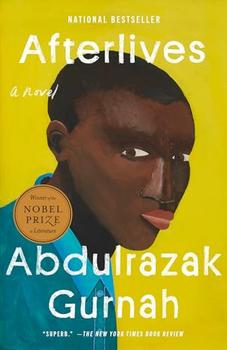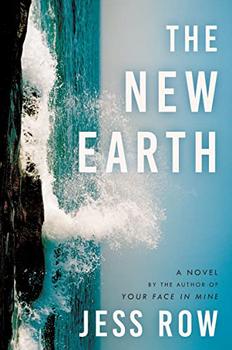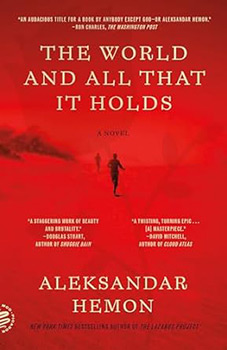Summary | Excerpt | Reviews | Beyond the book | Read-Alikes | Genres & Themes | Author Bio

Critics' Opinion:
Readers' Opinion:
First Published:
Aug 2022, 320 pages
Paperback:
Sep 2023, 320 pages
 Book Reviewed by:
Book Reviewed by:
Chloe Pfeiffer
Buy This Book
Afterlives, from Nobel Prize winner Abdulrazak Gurnah, begins in late 19th century East Africa in the early years of German colonial rule. The Germans called the area Deutsch-Ostafrika, declared themselves the rulers of the land, and formed a schutztruppe—colonial army—to stamp out rebellion. The schutztruppe was made up of askari—African mercenaries who, in Gurnah's telling, gleefully inflicted violence on rebels, civilians and enemy troops.
The characters in Afterlives live in a small, unnamed town on the coast of what is now Tanzania. Ilyas and his sister, Afiya, were separated as children and raised by strangers: Ilyas was kidnapped by an askari and raised on a German farm; Afiya, orphaned after Ilyas was kidnapped, was given to a family who essentially treated her as a slave, until Ilyas rescued her and brought her to the coastal town. On the outskirts of the town, a character named Hamza has also grown up in forced servitude.
When World War I begins, and European empires conscript African troops to play out the war in Africa—to fight for a cause that has little to do with them and on behalf of countries that have invaded their own—Ilyas and Hamza both leave to join the schutztruppe. Ilyas joins because he feels loyalty to the Germans; Hamza joins to escape his life of servitude, despite the terror he feels towards the askari. Right away, a frightening, high-ranking German officer takes a liking to Hamza and keeps him close (and relatively safe), producing gossip and jealousy among the other German officers and askari. When the war ends, Hamza makes his way back to the town and falls in love with Afiya; Ilyas never returns.
The second half of the novel follows Hamza and Afiya as they make a life for themselves and with each other in the shadow of the war. Hamza is still recovering from wartime nightmares and an injury, inflicted out of anger by a different, low-ranking German officer; Afiya wonders what happened to her brother.
The surprising thing about Afterlives is how little narrative tension there is; life is difficult for Hamza and Afiya, but most plot points that arise are resolved quickly. Sometimes it feels like Gurnah is setting us up for danger in a scenario where nothing eventful follows. When Hamza and Afiya marry and move in with Khalifa, Ilyas' friend who has cared for Afiya for over ten years, and his mean wife, Hamza does "not know how long he would be able to bear such ill-tempered patronage." Two pages later, the next chapter begins: "It was a time of ease for Hamza compared to the preceding years. The strain in their living arrangement… lessened as the weeks and months passed." And while the war's seven years of bloodshed and destruction are definitely not glossed over, we never see Hamza fighting—and, interestingly, the relationship between Hamza and his officer takes a less dramatic direction than the reader might expect.
In short, the world Gurnah has created is engrossing without being exciting, and the horrors of wartime are impressed on us without any theatrical climax. The prose, while propulsive, isn't flashy, especially when it comes to descriptors—there aren't any of those vivid, witty observations, often present in good fiction, in which the writer seems to have articulated something instantly recognizable about the world. Instead, we get lines that sometimes appear deflated and tautological. For example, when Hamza first sees the merchant he'll come to work for: "he seemed like a man completely absorbed in his own affairs, every inch the owner of the yard" and "[he had] the unhurried self-assurance of a man who had found his rightful place in the world." Or the simple cliches about women: Khalifa's wife "knew what she wanted" and "learned that she was stronger than him"; Afiya's friends sew "to ease the frustration of the hemmed-in lives they were forced to endure."
Gurnah's playing the long game here; the more important effect is the cumulative one. Like in life, watershed moments are buried deep within paragraphs; plotlines are dropped and forgotten until hundreds of pages later. Sometimes the book rushes through years and distance so quickly that the narration seems breathless, and yet, without any big dramatic moments, the world feels static—like when you're on a plane and you look at the motionless squares of land beneath you.
I think there's something about this slow-moving portrait that allows Gurnah to capture the complexity and enmeshment of colonial relations; he's managed to blur the lines between German colonizers and native Africans without presenting some flipped-script fantasy of moral ambiguity. The Germans are cruel and violent but so is everyone else; German kindness does not absolve them—and never translates into respect—but is also real and, multiple times, changes the course of an African character's life. This is not a tale of mutiny, or of decisive victory, but rather one of preserving one's autonomy in a world of powerful and sustained external forces.
I loved Afterlives, and was drawn in fully to its emotional world, which reads like life itself—languid, anticlimactic, ever moving but only gradually changing. The word "nourishing" occurred to me more than once. And the last line of the novel is the best, most surprising and perfect last line I've read in recent memory.
Earlier in the narrative, towards the beginning of Hamza and Afiya's courtship, Gurnah writes that Afiya "did not feel impatient and even liked the tense anticipation of fulfillment." That's what I felt reading Afterlives: the pleasurable, almost unbelievable sense—heightened by my constant doubt—that the future holds something good.
![]() This review
first ran in the September 7, 2022
issue of BookBrowse Recommends.
This review
first ran in the September 7, 2022
issue of BookBrowse Recommends.

If you liked Afterlives, try these:

by Jess Row
Published 2024
A globe-spanning epic novel about a fractured New York family reckoning with the harms of the past and confronting humanity's uncertain future, from award-winning author Jess Row

The World and All That It Holds
by Aleksandar Hemon
Published 2024
The World and All That It Holds―in all its hilarious, heartbreaking, erotic, philosophical glory―showcases Aleksandar Hemon's celebrated talent at its pinnacle. It is a grand, tender, sweeping story that spans decades and continents. It cements Hemon as one of the boldest voices in fiction.





The House on Biscayne Bay
by Chanel Cleeton
As death stalks a gothic mansion in Miami, the lives of two women intertwine as the past and present collide.

The Flower Sisters
by Michelle Collins Anderson
From the new Fannie Flagg of the Ozarks, a richly-woven story of family, forgiveness, and reinvention.

The Funeral Cryer by Wenyan Lu
Debut novelist Wenyan Lu brings us this witty yet profound story about one woman's midlife reawakening in contemporary rural China.
Your guide toexceptional books
BookBrowse seeks out and recommends the best in contemporary fiction and nonfiction—books that not only engage and entertain but also deepen our understanding of ourselves and the world around us.